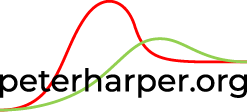Fringe Science
In the Climate Change field we tend to find orthodox science lined up against 'the loonies': deniers who at first sight appear to have no clue about the scientific basis for climate change, or even about the depth of their ignorance. One result of this is that 'we' (the True Believers, I speak facetiously) cleave ever closer to the core notion of scientific knowledge generated by dedicated researchers subject to the "refiner's fire" of peer review that blasts away dross and error. Truth against Falsity.
On the whole this cuts no ice with deniers, and indeed there are quite a few who try hard to deploy scientific data and reasoning against the orthodox consensus. In my view they are sincere and worth listening to. It remains extremely difficult to engage in genuine dialogue, and indeed it is a classic example of a 'paradigm debate'. But we do have to behave scrupulously. Here is an example of what often happens:
Orthodox science does tend to look with disdain upon theories, ideas, and technologies based on heterodox principles. This is not surprising, but in my view orthodoxy rather overdoes it. In retrospect it probably would have been better to be more polite and accommodating to the more thoughtful part of the 'sceptical' community, spend more time trying to identify common ground from which to test alternative hypotheses and give fewer grounds for accusations of 'group think', 'bullying', 'appeals to authority' etc.
The same is true in a somewhat less momentous matter, of whether the prevailing physicalist paradigm is broadly correct. I am thinking particularly of the work of Rupert Sheldrake, considered a pariah in many sections of the scientific community, whose TED talk (for example) was censored. A careful reading of Sheldrake's work reveals someone who simply starts in a slightly different place, with a different set of expectations about the fundamental structure of the universe, but otherwise proceeds in the 'correct' scientific manner, with the same ethics and logic. Sheldrake tries hard to test his own claims, and invites others to refute them, as he should. Occasionally he says, 'I was wrong'.
According to the Rules, Sheldrake (and others) deserve as much respect as any other scientist, provided they themselves obey the Rules. It seems to be that they are meticulously obeying the Rules but not complying with the provisional paradigm. Paradoxically, orthodoxy appears to bending the rules in order to stifle dissent.
From the point of view of the main battlegrounds, it might be supposed that climate deniers will use what seem to be attacks on 'science' to paint the whole enterprise as an ideological construction. They are not able to distinguish between attacks on certain matters of substance and attacks on the ethos and process and 'track record'. Possibly this is a matter of concern, but we must have fora (like this one) where we can call a spade a spade.
Turning now to the substance of what Sheldrake and others are investigating, I have kept an interested eye on a wide variety of 'fringe' phenomena for over 50 years. Although in most respects I am rather grimly orthodox and 'physicalist', in my judgement there is enough evidence in these 'rejected' areas of science to convince me that the orthodox prejudices are radically incomplete, although of course they work well in most circumstances most of the time. The obvious analogy is the difference between Newtonian physics (ideal for 99% of everyday life) and relativity and quantum theory that demonstrate the incompleteness of the simple Newtonian account.
My bottom line is 'obey the Rules and keep an open mind'.
Further material on this topic, within the web site, can be found in the Science section of the Library. For a sample of what I have thinking recently, see A New Conversation with the Scientific and Medical Network.
It is striking that although this was published in the SMN’s journal, this direct challenge to an important professional community sympathetic to Fringe Science received no response whatever. This was a great disappointment to me, suggesting that even the more coherent and thoughtful wing of the Fringe Science community is lost in a kind of cultish unwillingness to look outside its own hall of mirrors.
It can be seen, however, as yet another part of The Great Paradox: there is nothing special about this group; they join most academics in finding acceptable displacement activities that obscure the real physical needs of the present.

